MADRID.– The social scene in Cuba seems to be getting worse, as detailed by the NGO Cubalex in its recent report in which it details that the repression by the dictatorship and the migratory exodus have not yet reached their highest level.
“In the coming quarters, patterns of state repression in Cuba are likely to not only persist, but also intensify. This could be particularly notable in response to major events and as a result of the deepening economic and social crisis that the country faces. Consequently, an increase in social discontent could be evident,” Cubalex indicated in the report CUBA UNDER THE MAGNIFYING GLASS: REPRESSIVE TRENDS AND CRISIS OF 2022-2023.
The text also details that “Given this panorama, migration can continue to be a main way through which citizens seek to escape internal adversities. Likewise, it is expected that internal tensions and challenges related to internal security will remain as aspects worrying”.
Cubalex indicated that the increase in repression results in self-censorship and fear on the part of civil society.
The published report also highlights the “alarming” use of the law as a repressive and trauma tool, generating greater distrust in the regime and the decrease in civic participation that sustained repression brings.
Cubalex considered that the growing pattern of repression by the Cuban authorities requires an urgent and continuous response from the international community and organizations dedicated to human rights.
The organization identified the following patterns in the last year:
- 1. Continued Economic and Social Crisis: The economic and social crisis, especially in the management and supply of basic services such as electricity and public health, has been a constant. This pattern suggests that the economic crisis will continue to be a significant problem in the future.
- 2. State Repression and Human Rights Violations: The repression of activists, political opponents and human rights defenders, along with censorship and control of information, has been a recurring theme. This trend toward authoritarianism and restriction of civil liberties will likely persist.
- 3. Migratory Exodus: The continuous migration of Cubans, especially to the United States, in response to internal crises, is an established pattern. It is likely that migration will continue to be an escape valve for citizens in the face of difficulties in the country.
- 4. Popular Responses to Crises: Protests and strikes in response to economic and social crises, such as utility outages, are a common pattern. This indicates that protests and social unrest could continue to emerge in response to continued difficulties.
- 5. Sustained Increase and Diversification of Repression: There is a progressive increase in the number and variety of repressive incidents, including arbitrary detentions, forced transfers, surveillance, and the use of the law as a repressive tool. This pattern suggests a more aggressive and systematic government strategy against dissent.
- 6. Violations of Rights in the Penitentiary System: Reports of mistreatment, torture and inhuman conditions in detention centers continue, reflecting serious violations of human rights, especially towards political prisoners.
- 7. Focus on Specific Groups and Use of Social Networks for Reporting: Selective and individualized repression against activists, families and specific groups persists. Simultaneously, social networks remain the main means of reporting and denouncing repressive incidents.
- 8. Geographic Extension: Incidents of repression spread across multiple municipalities and provinces, with a higher incidence in urban areas.
- 9. Violence and Insecurity: IIncidents of violence, including femicides, murders and robberies, highlight internal security problems in all quarters, which could indicate a deterioration of the social fabric and trust in state institutions. These security problems are likely to continue affecting Cuban society.
- 10. Foreign Policy and International Relations: Cuba’s foreign policy, including relations with autocratic countries and participation in international forums, remains a constant focus. Cuba is likely to continue seeking international support and maintaining strategic alliances.
Source: WRITING

